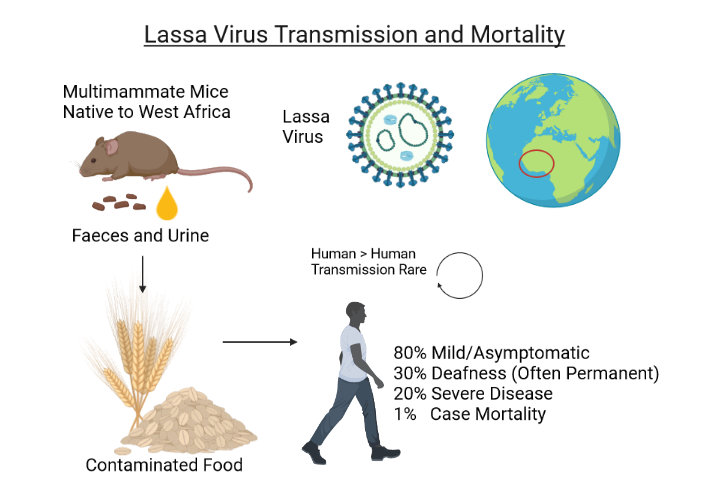Lassa fever is an acute viral haemorrhagic illness caused by the Lassa virus, a member of the arenavirus family of viruses. Humans usually become infected with the Lassa virus through exposure to food or household items contaminated with urine or faeces of infected Mastomys rats. The disease is endemic in the rodent population in parts of West Africa.
Lassa fever is known to be endemic in Benin, Ghana, Guinea, Liberia, Mali, Sierra Leone, Togo and Nigeria, but probably exists in other West African countries as well. Person-to-person infections and laboratory transmission can also occur, particularly in healthcare settings in the absence of adequate infection prevention and control measures.
Diagnosis and prompt treatment are essential. The overall case-fatality rate is 1%. Among patients who are hospitalized with severe clinical presentation of Lassa fever, case fatality is estimated at around 15%. Early supportive care with rehydration and symptomatic treatment improves survival.
About 80% of people who become infected with the Lassa virus have no symptoms. 1 in 5 infections results in severe disease, where the virus affects several organs such as the liver, spleen and kidneys.
The incubation period of Lassa fever ranges from 2–21 days. The onset, when it is symptomatic, is usually gradual, starting with fever, general weakness and malaise. After a few days, headache, sore throat, muscle pain, chest pain, nausea, vomiting, diarrhoea, cough, and abdominal pain may follow. In severe cases facial swelling, fluid in the lung cavity, bleeding from the mouth, nose, vagina or gastrointestinal tract and low blood pressure may develop.
Protein may be noted in the urine. Shock, seizures, tremors, disorientation and coma may be seen in the later stages. Deafness occurs in 25% of recovered patients. In half of these cases, the hearing returns partially after 1–3 months. Transient hair loss and gait disturbance may occur during recovery.
Death usually occurs within 14 days in fatal cases. The disease is severe late in pregnancy, with maternal death and/or foetal loss in more than 80% of cases during the third trimester. Because the symptoms of Lassa fever are so varied and non-specific, clinical diagnosis is often difficult, especially early in the course of the disease. Lassa fever is difficult to distinguish from other viral haemorrhagic fevers such as Ebola virus disease, malaria, shigellosis, typhoid fever and yellow fever.
There is currently no licensed vaccine for Lassa fever, but several potential vaccines are in development. Despite not being licensed as a treatment for Lassa fever the antiviral drug ribavirin has been used in several countries as a therapeutic agent. However, there is still a need for a safe treatment with proven efficacy, and a range of potential treatments including immune therapies and drug therapies are currently being evaluated. No evidence supports the role of ribavirin as a treatment for Lassa fever.
Prevention of Lassa fever relies on promoting good “community hygiene” to discourage rodents from entering homes. Effective measures include storing foodstuffs in rodent-proof containers, disposing of garbage far from the home, maintaining clean households and keeping cats. Because Mastomys rats are so abundant in endemic areas, it is not possible to eliminate them from the environment. Family members should always be careful to avoid contact with blood and body fluids while caring for sick persons.
Lassa fever is known to be endemic. Healthcare workers seeing a patient suspected to have Lassa fever should immediately contact local and national experts for advice and to arrange for laboratory testing. Healthcare staff should apply standard infection prevention and control precautions.
Source: WHO

